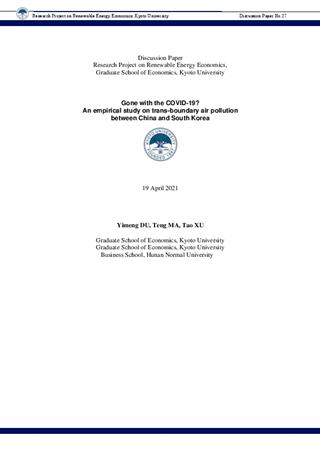TOP > ディスカッションペーパー > No.27 Gone with the COVID-19? An empirical study on trans-boundary air pollution between China and South Korea
No.27 Gone with the COVID-19? An empirical study on trans-boundary air pollution between China and South Korea
2021/4/19
Yimeng Du*, Teng Ma, and Tao Xu
*Senior Lecturer, Graduate School of Economics, Kyoto University
 By using a vector autoregression model with exogenous variables, this study empirically estimated the trans-boundary impact of China’s air pollutants on South Korea, and discussed whether any such trans-boundary effect was reduced due to the lock-down measures adopted for decelerating the coronavirus disease 2019 (COVID-19) outbreak. Our findings show that South Korea’s air pollution is partly affected by China, while domestic pollution emissions are the main source of the severe air conditions. Specifically, we find that SO2 pollutants in capital regions of South Korea mainly orients from Gyeonggi province, while the PM2.5 concentrations are mainly caused by pollutants in Seoul and Incheon city. On the other hand, we find that the trans-boundary impact did not only exist across the “China to South Korea” route. SO2 pollutants in South Korea are confirmed to have trans-boundary impact on pollutant level of China as well. In addition, our estimated results suggest that during the COVID-19 outbreak, the lock-down measures taken in China lead to a decrease in the trans-boundary impact of both PM2.5 and SO2 pollution, and enlarged the gap between effect of domestic pollutions and trans-boundary pollutions. Our study concludes that the lock-down measures taken to contain the spread of COVID-19 in China, can lead to the improvement of air quality in nearby countries.
By using a vector autoregression model with exogenous variables, this study empirically estimated the trans-boundary impact of China’s air pollutants on South Korea, and discussed whether any such trans-boundary effect was reduced due to the lock-down measures adopted for decelerating the coronavirus disease 2019 (COVID-19) outbreak. Our findings show that South Korea’s air pollution is partly affected by China, while domestic pollution emissions are the main source of the severe air conditions. Specifically, we find that SO2 pollutants in capital regions of South Korea mainly orients from Gyeonggi province, while the PM2.5 concentrations are mainly caused by pollutants in Seoul and Incheon city. On the other hand, we find that the trans-boundary impact did not only exist across the “China to South Korea” route. SO2 pollutants in South Korea are confirmed to have trans-boundary impact on pollutant level of China as well. In addition, our estimated results suggest that during the COVID-19 outbreak, the lock-down measures taken in China lead to a decrease in the trans-boundary impact of both PM2.5 and SO2 pollution, and enlarged the gap between effect of domestic pollutions and trans-boundary pollutions. Our study concludes that the lock-down measures taken to contain the spread of COVID-19 in China, can lead to the improvement of air quality in nearby countries.
Keywords:COVID-19, trans-boundary air pollution, VAR-X

